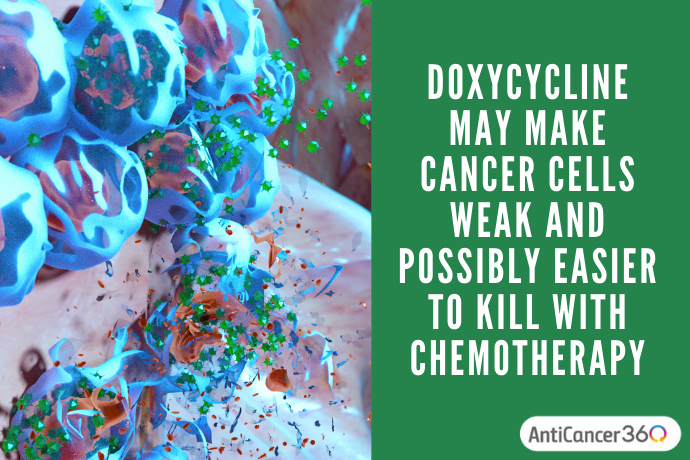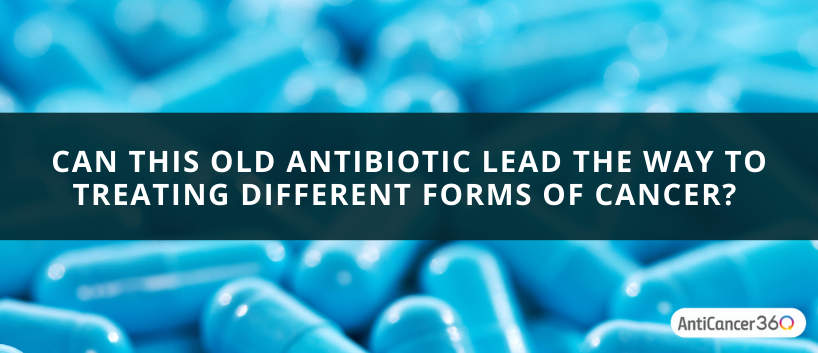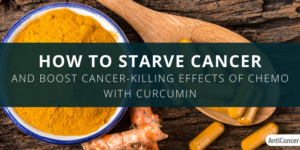Cancer is not an easy topic to discuss, let alone understand as there is a ton of clinical information and complex scientific concepts. When it comes to receiving a cancer diagnosis, this news can understandably be very hard to digest and accept.
In an effort to better understand your situation, you may feel like you suddenly need to learn everything you can about your specific type of cancer. Keeping up with the latest in cancer research and treatment can seem like a daunting task as it is a field of research that is ever-changing. If you are already researching how to beat cancer then you have the right mindset, and should consider yourself one step ahead!

One area of cancer research has to do with an old antibiotic, doxycycline. Used for decades to fight many different bacterial diseases and malaria, doxycycline has received new interest, but this time it is for fighting cancer.
Like metformin and ivermectin, doxycycline is being studied as a potential off-label anticancer agent, most often in combination with other chemotherapy. There are many research studies demonstrating combinations of different traditional cancer medications with doxycycline that have additional positive effects against cancer cell lines.
So, in today’s post, we are going to talk about the science behind doxycycline, and how you can use it to your benefit. Just how does this old antibiotic work? What benefits does this medication have that could stop cancer? Depending on your personal situation, this may give you a valuable advantage in your fight against cancer.
What is Doxycycline?
Doxycycline is part of an antibiotic class known as tetracyclines. Doxycycline was approved by the FDA in the late 1960’s as a wide spectrum antibiotic. Wide spectrum means that a variety of disease-causing bacteria are vulnerable to the actions of doxycycline, including activity against a broad range of gram-positive and gram-negative bacteria. In addition to treating many bacterial infections, it also treats diseases caused by protozoa like malaria [1].
Doxycycline comes as a generic prescription drug in the forms of doxycycline hyclate, doxycycline monohydrate, and doxycycline calcium. They all contain the same active ingredient. Some examples of brand-name drugs that contain doxycycline are Adoxa, Monodox, Vibramycin, and LymePak [2].

The antibiotic works by stopping bacteria from making proteins it needs to grow and replicate. But how exactly does this antibiotic help fight cancer? Although many of the studies completed have been in vitro (in cells), doxycycline appears to exert many anti-cancer mechanisms and may give an added boost (synergy) to traditional chemotherapy.
Doxycycline May Have Synergy With Certain Chemotherapies
Doxycycline has shown the ability to induce cell death (apoptosis) and stop cancer cells from spreading (metastasis). Additionally, doxycycline has been shown to affect cancer cell mitochondrial function, mitochondrial protein synthesis, and it has the ability to deprive the cancer cell of much needed oxygen [3].
In a 2017 study of the relationship between doxycycline and doxorubicin (Adriamycin) in treating castration-resistant prostate cancer (CRPC), the authors tested this combination in vitro on a CRPC cell line, PC3. The authors found that the combination treatment had a synergistic enhancement of cancer cell toxicity, cancer cell apoptosis, and increased the amount of cancer cells that were unable to replicate [4].
Normal healthy cells and cancer cells rely on the mitochondria to provide energy to the cell. The mitochondria are the powerhouses of the cell. We know that cancer cells have higher energy demands by virtue of having lost the “checkpoints” on uncontrolled cellular growth.
A well documented pathway known as oxidative phosphorylation is heavily relied upon by tumorigenic and metastatic cancer cells, also known as cancer stem cells, for their energy. Known to proliferate rapidly, these cancer stem cells utilize glutamine and glucose as the primary fuel to drive oxidative phosphorylation.

A 2020 study examined how doxycycline works with gemcitabine (Infugem) to attack human lung, pancreas, and colon cancer cell lines. Researchers showed that doxycycline inhibited mitochondrial protein synthesis, which affected the amount of energy the cancer cell mitochondria produced. Since the cancer cells were unable to maintain their specific energy requirements, they became weak and easier targets to kill with gemcitabine [5].
These two recent research studies on doxycycline offer a new potential advantage in the battle against cancer, especially treatment resistant cancer and cancer stem cells. Current treatments include using many different modalities like radiation, surgery, and medications throughout the course of treating cancer. Why not consider adding doxycycline to the arsenal to fight cancer on all fronts?
Frequently Asked Questions about Doxycycline: Dosages, Side Effects, and Precautions
How can I get doxycycline?
Doxycycline is only available with a prescription from your healthcare provider. The drug comes as oral capsules, extended-release oral capsules, powder for suspension, and tablets. Doxycycline is available in brand-name and inexpensive generic forms [6].
Can doxycycline cure cancer?
The short answer is no. Doxycycline has not been shown to cure cancer.
Based on numerous research from preclinical studies (lab-based studies of human cancer cells or mice), current evidence suggests that doxycycline, in combination with certain chemotherapeutics, may enhance anticancer effects in:
- Breast cancer
- Lung cancer
- Prostate cancer
- Osteosarcoma (a type of bone cancer)
- Colon cancer
What are the common side effects of doxycycline?
When taking doxycycline capsules or tablets, you should drink plenty of water to prevent irritation to your esophagus (the tube that connects your throat to your stomach). Common side effects of doxycycline include abdominal pain, increased sensitivity to sunlight, diarrhea, and nasopharyngitis (common cold symptoms) [7].
Allergic reactions can occur while taking doxycycline so it is best to check with your doctor regarding your medication allergy history especially if you have a documented tetracycline allergy.
Also note that doxycycline isn’t safe for everyone. Healthcare practitioners will likely not prescribe doxycycline for children or people who are pregnant or breastfeeding.
What drug interactions can occur with doxycycline?
While taking doxycycline there could be drug interactions with your existing medications [8].
Also, be sure to take doxycycline at least two hours apart from mineral-containing products, such as calcium, magnesium, iron, or zinc supplements. Also avoid eating dairy or other calcium-fortified foods within two hours of your dose. These minerals can bind to doxycycline, reducing its absorption and making it less effective.
Other drugs known to interact with doxycycline include but are not limited to acitretin (retinoids), methotrexate, and penicillins.
Can Doxycycline Help in the Fight Against Cancer?
Ultimately, when using an Aggressive Integrative Approach to cancer, the goal is to fight cancer from every possible direction. This approach includes examining repurposed medications and integrating the use of natural supplements to fight cancer based on available evidence, despite limited human data, and doing it in a way that won’t interfere with your oncology treatments.

How are you approaching your cancer treatments? Are you taking any natural or dietary supplements? Have you taken doxycycline? Have you made any other lifestyle changes that have made a noticeable difference in your fight against cancer? Please let us know in the comments below!
Are You A Good Candidate For Our Program?
If you’d like to learn more about the AntiCancer360 approach and see if we can help you… please watch our free online webinar to learn more about our approach. Then at the end, you’ll be able to schedule a free call with someone from our team so that we can discuss your case in more detail.
Dr. Andrew Cox is a graduate of the University of Pittsburgh and is part of the AntiCancer360 team as a consultant pharmacist and medical writer. He received his Bachelor’s degree in Biology from Marist College and a Master of Arts in Cell Biology from Villanova University prior to completing his Doctor of Pharmacy at Pitt. He also completed his Masters of Business Administration from the University of Maine. His expertise helps us create safe herbal and supplement combinations and avoid potential drug interactions.
Andrew has been a licensed pharmacist since 2013 with experience in outpatient retail pharmacy, long term acute care, and managed care pharmacy. He is interested in the appropriate utilization of natural substances to effectively prevent and treat cancer in addition to the traditional treatment strategies. He is also interested in the research and the latest findings of the mechanisms by which various natural compounds affect the tumor microenvironment
In his free time, Andrew enjoys traveling, reading, and the Premier League games on the weekends. He resides in Pittsburgh, Pennsylvania with his wife, daughter, and a boxer mix named, Party Martie.







